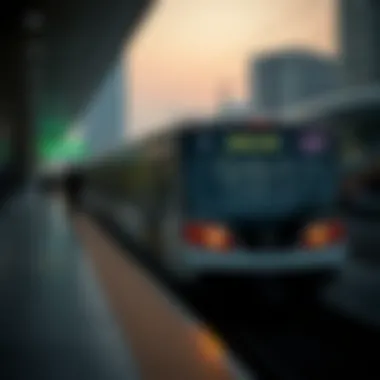Explore Dubai Metro Saturday Timings and Impact


Intro
Navigating the rapid urban landscape of Dubai can sometimes feel like a whirlwind. One of the most crucial aspects of this vibrant city is its public transport system, notably the Dubai Metro. Particularly on Saturdays, understanding the operational timings is vital for everyone, from daily commuters to curious tourists. This piece breaks down the service schedules, key insights on commuting patterns, and how these affect the real estate scene in the city.
The Dubai Metro operates on a timetable that varies from weekdays to weekends. This difference is especially notable on Saturdays, when many residents seize the opportunity to relax or run errands. Knowing the ins and outs of the Saturday metro timings allows for better planning and ensures one makes the most of what Dubai has to offer.
As you read through, you'll discover snippets about service frequency, peak and non-peak periods, and the general trajectory of property values tied to these schedules. With this information, you can optimize your travel and gain a stronger grasp of Dubai's evolving neighborhood dynamics.
Property Trends in Dubai
As the city grows, so do its neighborhoods and hotspots. The relationship between public transport schedules and real estate trends is fundamental for understanding the market.
Emerging Neighborhoods and Hotspots
Just as the desert blooms with life after the rains, Dubai's property scene witnesses new neighborhoods emerge, fuelled by demand from the Metro network. Areas that were once quiet are buzzing with life, particularly those connected directly to the metro line. For instance, neighborhoods like Dubai Marina have captured the attention of savvy investors due to their proximity to metro stations.
More recently, regions like Al Furjan are catching the eye of developers. This up-and-coming area promises both a community feel and accessibility, making it an appealing option for first-time homebuyers and seasoned investors alike. As the Saturday service times become more favorable, the appeal of these communities significantly increases.
Market Analysis and Future Predictions
With rising interest in weekend activities and tourism, understanding market trends is key. On Saturdays, the frequency of trains can determine how residents interact with their neighborhoods. If the metro runs frequently and efficiently, more visitors flock to particular areas, spurring growth.
For instance, recent statistics indicate a marked uptick in leasing prices in areas with convenient metro access on weekends. This trend is expected to continue as more high-rise developments crop up closer to transit points. As for the future, analysts predict that with the expansion plans set for the Dubai Metro system, values in suburbs like Jumeirah Village Circle and Dubai South will likely see increased demand.
"Investors should consider how the Saturday Metro schedule impacts foot traffic. Areas with higher traffic often see a corresponding rise in property desirability and value."
Investment Opportunities
For those looking to capitalize on Dubai's dynamic property market, recognizing the impact of metro timings is non-negotiable.
High-ROI Property Types
Properties situated near metro stations tend to yield high returns on investment. Residential units that cater to families or young professionals often perform well. One popular property type is studio apartments, which remain attractive for buy-to-let investors.
Similarly, commercial spaces in vibrant neighborhoods benefit from the influx of Saturday shoppers. Retail spaces near metro stations often have paying tenants and longer lease durations, signaling stable returns.
Financing and Mortgage Options
Navigating financially feasible routes in real estate investment can be daunting, yet knowing when and where to look can maximize profits. Many banks and financial institutions are offering competitive mortgage options, particularly for properties near major metro lines.
Investors should consider leveraging the shift in commuter patterns. With Saturday being a popular day for apartment viewings, working with financial advisors to secure favorable financing can ensure you’re ahead of the game when making offers on properties.
As we dig deeper into the significance of Dubai Metro timings on Saturdays, this understanding creates a well-rounded awareness for investors, agents, and developers alike, paving the way for informed decisions and strategic planning.
Overview of Dubai Metro
The Dubai Metro stands as a hallmark of modern urban transportation, intricately woven into the city's fabric. It is not just a means of transit but a vital lifeline for both residents and visitors alike. The system showcases how effective public transportation systems can significantly influence urban landscapes, making it a pertinent aspect to explore.
History and Development
The inception of the Dubai Metro dates back to the early 2000s, with construction kicking off in 2006. The ambition was grand; to create a rapid transit system that would relieve congestion on the roads and provide a seamless commuting experience. The line officially opened to the public in September 2009, boasting an advanced driverless system, a first in the Middle East.
It’s remarkable how this project reflected Dubai’s growth trajectory. The Metro has since expanded, now encompassing over 75 kilometers of track across two primary lines—the Red and the Green. Spearheaded by the Roads and Transport Authority (RTA), the expansion emphasizes the vision of becoming a global hub for business and tourism.
The developments continued, connecting various key locations, from bustling commercial centers to residential areas, thus ceaselessly adapting to the evolving landscape of the emirate.
Significance in Urban Transportation
The significance of the Dubai Metro cannot be overstated. It has transformed the mobility patterns in the city, where previously congested streets have seen a marked reduction in traffic. This transformation is particularly relevant on Saturdays, a day when many locals and tourists embark on outings or errands, making efficient transport crucial.
- Convenience for Residents: Every Saturday, many residents rely on the Metro for shopping trips, social gatherings, and recreational activities. Its extensive reach allows easy access to popular destinations, minimizing the hassles associated with parking or road usage.
- Boosting Tourism: Tourists benefit significantly from the Metro's coverage, enabling them to navigate the city effortlessly. With key attractions near various stops, it enhances their experience, allowing them to enjoy Dubai without the typical transport woes.
According to the RTA, the Metro serves more than 700,000 riders on weekends, underscoring its role as an indispensable part of daily life in Dubai.
Dubai Metro Operations on Saturdays
Understanding the operations of the Dubai Metro on Saturdays is crucial for both residents and visitors. Saturdays, being the first day of the weekend in the UAE, witness a unique commuter dynamic. This day sees a mix of citizens, expatriates, and tourists utilizing the metro for various reasons, which amplifies the significance of an efficient operational system.


Operational Timings
On Saturdays, the Dubai Metro operates under distinct timetables that cater to the varying needs of passengers. Generally, trains run from 10:00 AM to 1:00 AM the following day. This schedule allows ample time for leisure activities, shopping, and other weekend pursuits. For those looking to catch a late-night train, the extended hours mean that options are still available well into the night.
It's worth considering that, unlike weekdays when the service begins at 5:00 AM, the later start on Saturdays aims at accommodating the more relaxed pace usually observed on weekends.
- Saturday Operational Hours: 10:00 AM - 1:00 AM
Frequency of Trains
The frequency of trains on Saturdays can vary throughout the day, which significantly impacts commuter experience. Typically, during peak midday hours, trains will arrive every 5 to 7 minutes, ensuring travelers don’t have to wait long. This frequency is especially beneficial for tourist hotspots and popular residential areas, making the metro a reliable choice for getting around the city.
- Peak Midday Frequency: 5 to 7 minutes
- Evening and Night Frequency: May extend to 10 minutes due to reduced demand
The flexibility in operation allows for a steady flow of passengers, which is vital in a bustling city like Dubai where weekend leisure activity flourishes. Understanding these patterns can help commuters better navigate their travel plans, optimizing their journey whether they are heading to the iconic Mall of the Emirates or visiting local attractions.
"The Dubai Metro not only provides a vital link for commuting but also enhances the overall travel experience of the city, catering to all manner of passengers."
By comprehending the operational timings and train frequency, commuters can truly leverage the efficiency of the Dubai Metro system on Saturdays, ensuring that their outings are smooth and enjoyable.
For further details about the metro operations, you can visit the official RTA website.
For an overview of the Dubai Metro system’s history, check Wikipedia.
This deep dive into the Saturdays’ operations of the Dubai Metro unveils the intricacies that make urban transportation in this vibrant city not just functional but convenient.
Understanding the Weekend Frame
The weekend frame in Dubai holds significant weight for both residents and visitors. It reflects the unique cultural and social dynamics of the emirate. Saturdays in Dubai are often a bridge between the traditional workweek that stretches from Sunday to Thursday and the weekend festivities that many look forward to. Understanding the nuances of the weekend frame is essential for maximizing the utility of the Dubai Metro, as it directly affects schedules and passenger behavior.
Impact on Commuter Patterns
On Saturdays, the flow of commuters on the Dubai Metro shifts noticeably compared to weekdays. Many people engage in leisure activities—shopping, dining, or exploring local attractions—transforming the public transport experience. With families often traveling together, the dynamics change. There’s an observable uptick in passengers during midday, as adults with children balance their weekend plans.
Moreover, the demand for the metro service sees variations: early morning rides may be quieter, but as the day progresses, stations near popular malls or tourist spots witness higher footfalls.
- Key Points on Commuter Patterns:
- Increased family travel involves more children aboard.
- Midday travelling peaks due to leisure outings.
- Certain stations, like Burj Khalifa/Dubai Mall, experience surge traffic.
Transport networks in other cities often see similar trends; however, Dubai’s distinctive mix of traditional and modern values presents a unique case. Weekend outings blend seamlessly with daily chores, and this can sometimes lead to crowded cars during peak family outing times.
Analysis of Travel Demographics
Travel demographics on Saturdays reveal a rich tapestry of residents and tourists from diverse backgrounds. This day becomes a melting pot of cultures, making it crucial for service providers—like Dubai Metro—to cater to a wide array of needs. Young adults, families, and expatriates, each with different travel motivations, converge at metro stations.
In a city as dynamic as Dubai, the profiling of passengers provides insights into consumer behavior and preferences:
- Families: prioritize spacious areas, while carrying shopping bags or kids’ strollers.
- Tourists: often consult maps or ask about routes, seeking user-friendly experiences.
- Young Professionals: they typically use metro services as a means to meet friends or enjoy activities, often preferring late afternoon trips.
Understanding these demographics is beneficial not just for the metro's operational efficiency but also for businesses that line the corridors of various stations. Analyzing travel behavior allows for improved marketing strategies for local establishments, resulting ultimately in boosted sales and customer engagement.
"The engagement of various demographics on the Dubai Metro exemplifies the multicultural essence of this city, creating a truly unique travel experience every Saturday."
By exploring the weekend frame, its impact on commuter patterns, and the travel demographics involved, stakeholders—from metro authorities to local businesses and real estate agents—can adapt their strategies to better serve the population and harness opportunities. This understanding can lead to improved service delivery, with a significant focus on convenience and accessibility for all commuters.
Comparison with Weekday Schedules
The comparison between the Saturday schedules of the Dubai Metro and those on weekdays is crucial for both residents and visitors. Understanding this distinction helps in planning journeys more efficiently, whether for work or leisure activities. Motorists and metro users alike benefit from awareness of these differences, as it aids in anticipating busy periods and ensuring they make the most of their travel time.
Differences in Scheduling
When looking at scheduling, it becomes apparent that Saturdays feature a more relaxed timetable compared to weekdays. Here are some key differences:
- Operational Hours: On Saturdays, Dubai Metro generally operates from 10:00 AM to midnight, whereas on weekdays, services commence much earlier, around 5:00 AM. This later start gives riders a bit more leeway to sleep in or handle Saturday chores.
- Frequency of Trains: While trains on weekdays might arrive every 5 to 7 minutes during peak hours, Saturday service sees longer intervals, with trains scheduled every 10 to 15 minutes. This is crucial for commuters as they may need to adjust their travel plans accordingly.
- Peak and Off-Peak Periods: Unlike weekdays where rush hours can be frenetic, Saturdays tend to offer a more mellow travel experience. With fewer daily commuters, off-peak periods dominate most of the day, reducing stress and waiting time for those traveling.
These differences highlight the need for individuals to adapt their commuting habits based on the day of the week. Whether attending meetings, shopping, or exploring tourist attractions, an informed choice makes a considerable difference.


Usage Statistics
An in-depth look at the statistics regarding Saturday Metro usage tells a compelling story. Ridership tends to shift significantly compared to weekdays. Here's how:
- Saturday sees a dip in total usage—down about 30-40% compared to an average weekday. This statistic reflects the shifting dynamics where more people opt for leisure activities or family outings.
- The train lines serving tourist hotspots, though, may experience fluctuations in ridership. Destinations like the Dubai Mall can see spikes in commuter activity, particularly during sale events or public holidays.
Key Points:
- According to the Dubai Roads and Transport Authority, exact figures show a preference for outdoor and entertainment travels on Saturdays.
- On average, each Metro station experiences about 20% of their weekday footfall on Saturdays.
- Weekly travelers often plan around peak event schedules, impacting overall ridership positively or negatively.
It's clear that grasping these statistics is not just about understanding busier train cars or longer wait times. This knowledge can impact real estate decisions, too; properties near popular weekend destinations may flourish due to high foot traffic over Saturdays.
Understanding your travel options on Saturdays can make all the difference in your overall experience—be it for work, leisure, or witnessing Dubai’s vibrant atmosphere.
For further insights on Dubai’s transport developments, consider checking: Dubai Roads and Transport Authority and the latest statistics on Dubai Metro Usage.
Customer Experience on Saturdays
The customer experience on Saturdays is a pivotal aspect of the Dubai Metro's operations. This day, often seen as a blend of leisure and practical commuting, fosters varied customer needs that require special attention. For many, it’s not just about getting from point A to point B, but also a chance to enjoy the day, whether it’s for leisure, errands, or social engagements.
One of the main benefits of a well-curated customer experience on Saturdays is the improved accessibility to key areas across Dubai. The Metro connects passengers to shopping malls, parks, and cultural landmarks, making it an ideal option for families and tourists. With less hustle than weekdays, Saturdays offer a more relaxed journey, allowing passengers to sit back and relish the ride. This convenience can play a significant role in influencing commuting decisions, possibly even swaying individuals to opt for public transport over driving.
Moreover, the considerations surrounding customer experience also involve analyzing and addressing peak travel times. Recognizing when crowds might build up helps in implementing measures to alleviate potential congestion. By catering to customer expectations and preferences, the Dubai Metro can enhance satisfaction and foster loyalty among its users.
Accessibility and Convenience
Accessibility and convenience are essential elements when discussing the Dubai Metro's operation on Saturdays. The layout of the Metro system offers seamless transitions between various lines and stations, which is crucial for ease of travel. Riders can travel with confidence, knowing they can reach their destinations with minimal fuss.
- Station Locations: Stations are strategically placed near shopping centers and tourist attractions, significantly cutting commuting times.
- Facilities: Most stations have facilities such as elevators, escalators, and dedicated pathways for individuals with disabilities. This commitment to accessibility is vital in ensuring everyone can utilise the Metro comfortably.
What's more, the convenience is not just about physical accessibility. It also pertains to the digital aspects. The Metro app provides real-time information on train schedules, allowing passengers to plan their journeys effectively. The ease of purchasing tickets through various platforms adds another layer of convenience, making the travel process smoother.
Passenger Feedback and Insights
To shape a meaningful narrative around customer experience, it's paramount to delve into passenger feedback. These insights come from various channels, including social media platforms and direct surveys conducted within stations.
Understanding what passengers think helps the Dubai Metro fine-tune its operations and meet the evolving needs of its clientele. Feedback often highlights points such as:
- Waiting Times: Passengers appreciate swift response times and minimal wait durations on Saturdays when many prefer outings over time spent in transit.
- Safety Perception: Security is a fundamental concern. Feedback indicates that visible security presence and cleanliness significantly influence perceptions of safety, encouraging more people to rely on the Metro.
- Comfort: Riders express numerous opinions on seating availability and environment quality, indicating how ambiance affects their experience.
In closing, listening to passenger feedback not only bolsters operational improvements but also fosters a sense of community engagement between the Metro and its users. The aim is to continually refine experiences, thereby solidifying the public transport system as a choice of first resort rather than last.
"Understanding what passengers think helps Dubai Metro fine-tune its operations, ensuring a pleasant experience for all."
For additional insights on efficient commuting, visit resources such as Wikipedia or community discussions on Reddit.
By concentrating on customer experience, accessibility, and actively incorporating passenger feedback into their strategies, Dubai Metro can not only serve their current riders more diligently but can also draw in new users who value convenience and satisfaction in their commuting choices.
Real Estate Implications
The relationship between the Dubai Metro and real estate carries significant weight in the city’s market dynamics. Knowing how Dubai Metro impacts property values and accessibility to commercial hubs offers investors, homeowners, and developers considerable insights. This article will delve into the tangible benefits of being near Metro stations, and how these conveniences can sway buyer decisions and market trends.
Access to Property Hotspots
Being close to a Dubai Metro station can feel like having a golden ticket in an otherwise bustling city. Properties located within walking distance to a station often see a boost in desirability. The allure of metro access is undeniable, particularly in a metropolis where traffic congestion can put a damper on daily commutes.
Proximity to major stations like Burjuman, Deira City Centre, and Dubai Mall Station makes a property more attractive to potential tenants and buyers alike. Some key benefits include:
- Increased Foot Traffic: Businesses near a Metro line often benefit from higher customer footfall. This can create a thriving environment for retail outlets and cafés, boosting local economies.
- Desirability Among Young Professionals: The convenience of a short commute appeals to millennials and younger adults. This demographic often prefers locations with robust public transportation options, influencing housing demand in these areas.
- Enhanced Connectivity: Quick access to various areas of the city encourages not just residential living but a mix of commercial opportunities, which can stimulate urban growth.
In essence, real estate situated near the Metro transcends simple residential need and morphs into a pivotal investment in Dubai’s evolving landscape.
Impact on Property Values
Let’s dig into the core of the matter; property values near Metro stations tend to rise more rapidly in comparison to those farther away. According to recent trends, homes near major transit routes, such as the red line of the Dubai Metro, have experienced value appreciation that can be attributed to increased demand.


Some insights regarding the impact on property values include:
- Appreciation Rates: Research indicates properties in close proximity to metro stations have seen value increases of 15-20% over the years, compared to those in less accessible areas.
- Rental Yields: Landlords often command higher rents for properties close to metro stations. With commuting made easier, demand for rentals in these areas increases, thus allowing for optimal returns on investment.
- Long-term Sustainability: With city planners focusing on expanding the Metro network, areas already benefiting from metro access are poised for further growth and increased property values.
"The presence of a metro station can dramatically transform not just the traffic dynamics of an area, but its entire real estate landscape."
As the city develops and more people flock to Dubai, the impact of close metro access will likely only strengthen, making it a significant consideration for any serious investor or homeowner in the market.
Future Developments and Predictions
With the ongoing evolution of the Dubai Metro system, it's essential to focus on what the future holds. Innovations, expansions, and updated services are pivotal not only for daily commuters but also for investors and real estate developers. Anticipating these changes can significantly influence strategic planning and market positioning.
Proposed Enhancements to the Metro
When discussing proposed enhancements to the metro, several initiatives have come to light. First, the introduction of new lines aims to improve accessibility. For instance, the extension of the Red Line towards the Expo City, which began in 2020, represents a crucial move to connect key locations around the city. Additionally, upgrading existing trains with modern technology increases efficiency and passenger comfort.
Another notable development is the implementation of smart ticketing systems, such as the integration of mobile application features. This advancement allows commuters to plan their journeys while tracking real-time data, reducing wait times and optimizing travel schedules.
- Increased Capacity: Upgrades are not only about speed but also about capacity. Enhancing the physical infrastructure of stations can accommodate a larger number of passengers, thus reducing congestion during peak hours.
- Sustainability Initiatives: Sharpening the focus on sustainability, projects are being launched to incorporate eco-friendly technologies, such as energy-efficient trains and renewable energy sources powering stations. This commits to Dubai's vision of a greener future.
- Enhanced Connectivity: Plans to establish seamless linkages with other transport modes like buses and taxis promote mobility across various city sectors. Integrated solutions ease the flow of commuters, making it more practical for residents and tourists alike.
“Future enhancements to the Dubai Metro will not only transform commuting but will also serve as a catalyst for further urban development.”
Trends in Commuting Preferences
Commuting preferences are shifting significantly, influenced by factors including lifestyle changes, technology, and economic conditions. Today, many residents favor public transportation due to its cost-effectiveness and convenience. As Dubai continually attracts more expatriates and tourists, understanding these trends is pivotal.
- Rise in Remote Work: The pandemic has shifted many companies to flexible work arrangements. Consequently, the need for public transport is evolving. Many commuters now focus on off-peak travel options, taking advantage of quieter periods to navigate the city.
- Increased Use of Apps: Commuters increasingly rely on mobile applications for navigating the metro and planning trips. Applications can suggest optimal travel times, helping individuals avoid crowded train cars.
- Preference for Eco-Friendly Options: Environmentally conscious commuters are driving a demand for options that reduce their carbon footprint. More individuals are looking into public transport as a viable alternative to personal cars.
In short, understanding these upcoming trends is crucial for investors and urban planners alike. The strategic foresight into how and why commuting preferences are changing lays the groundwork for better aligning transportation services with community needs. With the civil landscape of Dubai maintaining a dynamic influence, staying ahead of these trends will facilitate stronger, more sustainable urban growth.
Tips for Commuters
Navigating the Dubai Metro on Saturdays can be a mixed bag. While it provides a vital link to city hotspots and is an eco-friendly means of transportation, understanding how to utilize the system effectively is crucial for any commuter. These tips aren't just helpful; they can significantly enhance your travel efficiency as well as save time. Before diving into the specifics, let’s acknowledge the importance of proper planning when using the metro on a Saturday.
Maximizing Travel Efficiency
When it comes to using the Dubai Metro, efficiency is the name of the game. To get the most out of your journey, there are several key strategies you should consider:
- Plan Your Route: Familiarize yourself with the metro map. Identify your starting and ending stations ahead of time, so you aren't wandering aimlessly at the station. The metro system is well-structured, with clear signage to guide you.
- Use the Metro App: Downloading the RTA (Road and Transport Authority) app can make your travels smoother. It provides real-time information about train schedules, delays, and other essential updates.
- Choose Off-Peak Times: Saturdays vary considerably from weekdays. Traveling during non-peak hours, usually in the early morning or late evening, will not only reduce your travel time but also lead to a more pleasant commuting experience as trains are less crowded.
- Transfer Carefully: If your journey involves a change of trains, factor in transfer times. Knowing the transfer points and expected wait times will help you manage your trip more effectively.
- Consider Multi-Modal Travel: Sometimes, combining the metro with other forms of transit like buses or taxis might be more suited for your commute, depending on your ultimate destination.
Strategies for Avoiding Peak Hours
Saturdays can be surprisingly busy, especially when events or activities draw crowds. If you want to steer clear of the hectic rush, here are some strategies:
- Travel Early or Late: Aim to board the metro outside of the standard commuting hours, usually before 10 AM or after 8 PM. This will give you breathing room and a seat if you start early.
- Stay Informed: Before you embark, check the upcoming events in Dubai. Large gatherings can drive up commuter numbers. Websites like Dubai Calendar can help keep you in the loop.
- Flexibility is Key: If it’s possible, adjust your schedule. If you can afford to take a later train, why not? It saves you from the congestion.
"When it comes to commuting, there’s wisdom in being reactionary rather than proactive. Better yet, blend the two for the best results."
- Utilize Updates and Alerts: Keeping an eye on local traffic news or registering for notifications from the RTA can serve you well for adjusting your timing in response to unexpected delays or congestion.
In the end, beating the Saturday rush isn't merely about timing; it also involves strategic planning due to the fluctuating nature of travel on weekends. By incorporating these tactics into your commuting habits, traveling via the Dubai Metro can become smoother and ultimately more enjoyable.
The End
Understanding the Dubai Metro's operational timings on Saturdays is not just a matter of knowing when trains run—it plays a crucial role in the daily lives of residents and visitors alike. For investors, agents, and anyone involved in the real estate sector, awareness of these timings helps in assessing the connectivity and accessibility of various neighborhoods. Such insights allow for informed decisions that can enhance property value over time.
Summarizing Key Takeaways
- Operational Timings: The Metro operates on a slightly adjusted schedule during Saturdays, which affects planning and productivity.
- Service Frequency: The frequency of trains may change, with longer intervals during off-peak hours. Commuters need to be aware of these changes to avoid unnecessary waiting.
- Commuter Patterns: Understanding how Saturday service affects commuter flow and peak periods can reveal trends that are essential for real estate considerations. Investors can capitalize on locations with high accessibility and foot traffic.
- For example, trains generally start a bit later than usual, which can influence morning routines.
- Being savvy about when trains run can save time and make for a smoother commuting experience.
Final Thoughts on Dubai Metro Timings
The information presented about the Dubai Metro's Saturday timings equips both commuters and stakeholders with valuable insights. Knowing the ebb and flow of train schedules not only enhances personal travel plans but also sheds light on broader demands for residential and commercial properties.
Investors should continuously monitor these factors as they reflect changing demographics and commuting behaviors. Ultimately, being well-informed about the Metro system on Saturdays can lead to strategic advantages, whether in daily commutes or long-term investment decisions.
"Understanding public transport schedules can unlock countless opportunities in urban environments."
For more information on Dubai Metro’s operational specifics, consider checking out resources like Dubai RTA or look up user experiences and queries on platforms like Reddit. These can provide further insights into the evolving nature of commuting in this bustling city.















